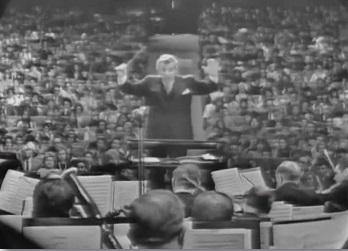GRANTS, NM--“Farewell to Nationalism,” such an unusual title for an artistic presentation, was first performed on November 30, 1964 in New York City’s Metropolitan Opera. But this concert is not at all politically motivated, although when writing their compositions the composers were no doubt expressing the emotional views in a way only their own country could express them. The purpose behind this program by Leonard Bernstein’s Young Peoples Concert series was to discuss and give examples of the difference between national styles and international styles through the styling examples of work by Smetana, de Falla, and Ives performed by the New York Philharmonic.
As Bernstein (pronounced burnstine) enters the stage it is obvious that the audience adores this maestro. He immediately approaches the conductor’s podium, skipping his usual introduction and explanation of the program ahead, and he begins to lead the orchestra in “Gli҅e҅re: Russian Sailor’s Dance”.
This first sample of nationalistic music is a Russian composition. As Bernstein puts it, it is full of, “Russian folk spirit, folk melody, folk rhythm. In other words, … music that reflects the character of a particular nation, whether that nation be Russia or France or Peru or the Navajo Indian tribe.”
Next, Bernstein engages the audience by playing brief snippets of familiar pieces and asking them to guess the composer and his nation. The first was from Hungary, Liszt’s Second Hungarian Rhapsody. It took the audience a couple of tries, but they got it right on the second guess. Next, a very dramatic and easily recognized piece, Spanish, from a ballet by de Falla.
Now the maestro begins the lesson of international music. What is meant by that evolved term is that since the last world war it is no longer so simple to recognize the national origin of a composition. To demonstrate, he plays a complete piece, which is only about one minute long. It is the German composition by Austrian composer Anton Von Webern (Von Vayburn), written in the year 1913. Surprisingly, one of the young students in the audience guesses on the first try, even though the piece has no typical German attributes. His next sample is by modern Japanese composer, Mayuzumi. It has a similar sound to the German piece, but its origin is of a culture thousands of miles away.
“Perhaps music is finally becoming what so many people have always liked to call it, a ‘universal language’ “ Quips Bernstein.
Young musician hopefuls enjoyed the concert presented for their education.
Other examples were by American composer, Milton Babbitt, composed in 1948, and Italian composer, Nono. I probably shouldn’t say this because it shows how little I know about great music, but it all sounded like background music in a movie. That’s my two cents, but one member of the audience commented that the sound was from Mars. So, does that give you an idea? Bernstein was only saying that due to advanced technology, and he said this in the nineteen sixties, such as airplane travel, fashion, and news services, of course music has also been influenced by the greater access to artistic expressions.
To make the subject more confusing he stated that not all past music was recognizable by national traits. To exemplify that statement, he played two short sections, one from Bach, German, and one from Vivaldi, Italian. If they had been composed in this twenty-first century one of them would have been charged with plagiarism!
Bernstein simplifies the topic by reassuring us that most of the music we love today was composed during the very nationalistic nineteenth century, which is why we are so familiar with the sounds of their countries of origin.
To prove this point the conductor ends the program with three very nationalistic compositions from that period. They are easily recognized for their distinct orchestration and mood. Those are: “The Fourth of July” by American composer Charles Ives; the dances from Part One of Spanish composer de Falla’s ballet, “Three-Cornered Hat” with it’s leaping, lilting violins and arrangements; and the voluptuous “Muldau” by Bohemian composer Smetana.
Please attend next week’s Young People’s Concert with conductor, Leonard Bernstein.

